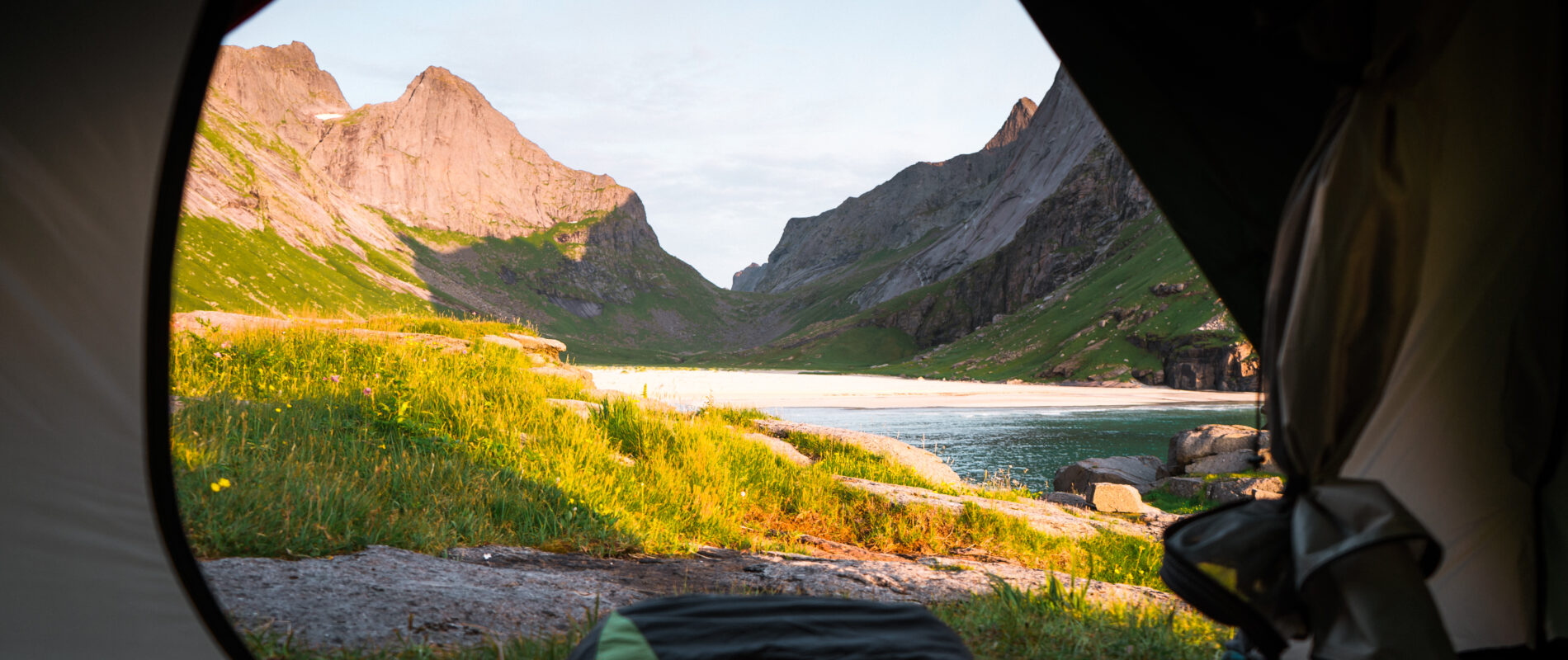One of the hardest parts of planning your travels is managing the budget. Transportation, food, accommodation… it all adds up pretty quickly. The good news is there are many ways of keeping accommodation costs down!
This guide details five of the most popular ways to secure free accommodation for your upcoming trip. We also break down the pros and cons of each, so that you can find the right option for your personal levels of comfort and safety. Plus, we’ve included first-hand accounts from the pvtistes team of what our experiences with free accommodation have really been like.
1. Volunteering
One of the best ways to secure free accommodation is by working for your bed and board. You will usually see a host family advertise a bed or room in their house/on their property (sometimes, meals are included too), in return for a few hours per day of farm work, gardening, carpentry, cleaning, etc.
There are quite a few popular websites that travellers regularly use, including WWOOF, Workaway, HelpX and Worldpackers. Keep in mind that there’s usually a fee involved to set up a full profile—some offer a free option but you are limited with what you can do, e.g. you can’t reach out to hosts or you won’t have access to the search function.
However, the fee is usually reasonable and you can make back the money, as it were, in the amount you save on accommodation costs after completing one or two homestays.
Pros:
- It’s a great way of immersing yourself in “real” culture and getting out of the backpacker scene. Most hosts are friendly and willing to help out, for example giving you lifts into town, inviting you to family meals, or showing you around their favourite spots.
- You may be learning a new skill or strengthening your CV.
- It can help you find longer-term work opportunities because you’ll have started building a local network.
- Many places can house several workers at a time, which means you’ll be able to socialise with like-minded travellers, as well as the host family.
Cons:
- You have to work a set amount of hours per day in return for the accommodation. As a result, it can be hard to find time for exploring the area you’re in!
- Depending on the type of work, you might be able to find similar roles that are paid, which would be a better financial move than working for free…
- Many listings are looking for help with manual labour, which can be limiting if you’re not a very physical person. You will have to create a strong profile on your chosen platform to ensure you have a chance at being picked over the competition.
If you’ve already got a Working Holiday Visa, you’re good to go. But if you’re travelling on a tourist visa, you need to check if you’re allowed to volunteer without a work visa!
Learn more about what volunteering for accommodation entails, and what visas you need: Volunteering with WWOOF, Workaway, or HelpX.
2. Au pairing
For anybody who loves spending time with children, au pairing is a great way of working for accommodation. Being an au pair usually involves helping with school runs, mealtimes, entertaining the younger children (not yet in school) throughout the day, and maybe the occasional night shift.
There are several ways you can secure an au pairing job. Many families will post on websites such as those mentioned above (HelpX, Workaway, etc.) or on local Facebook groups. You can apply to these directly for free, but be careful when vetting the family, as it will be your responsibility to find a new placement if it doesn’t work out.
Alternatively, you can apply via an agency. This may involve paying a fee to sign up and going through a rigorous interview process. In turn, the agencies can assist you with finding placements and, sometimes, even organising your travel and visa.
Pros:
- Unlike volunteering for accommodation, au pairing can also be advertised as a paid position or may include “pocket money”. Earning any form of money over volunteering will help fund your future travels.
- You might also get other perks included with the job, e.g. your groceries/meals covered, or access to the family car.
- If you get on well with your host family, having that close bond can help ease the sadness of leaving behind your own family to travel.
Cons:
- If you get a bad match, it can be very difficult to enjoy your time, especially if you haven’t got agency support to find a new job.
- Even if you have a great match, you won’t get much downtime, because you live with the family. It’s often hard to explain the concept of “days off” to a child who wants to hang out with you 24/7!
- It can be isolating—many au pairs spend so much time with the family, they don’t meet other travellers that often. This is especially true when au pairing in rural areas where you might be the only backpacker around.
3. Housesitting
If you’re more comfortable with animals than children, housesitting could be the perfect match. Note that although housesitting doesn’t specifically mean petsitting, most housesits advertised will involve caring for pets, as well as the house and garden.
Housesitting means living in somebody’s home while they are away, running the household as they normally would—mowing the lawn, collecting mail, vacuuming carpets, walking dogs, and so on. In return, you stay rent-free, as the homeowner continues to pay for all the usual bills while they travel.
Research which websites are popular in your destination country. Trusted Housesitters is popular worldwide, but some countries have their own local websites (e.g. Mad Paws in Australia or House Sitters Canada in Canada). Create a profile that highlights your experience with caring for animals and keeping homes clean and tidy.
Similar to the volunteering websites, you may be able to make a free profile, but you’ll be limited on which parts of the website you can access and which homeowners you can reach out to. You will benefit most from paid membership—it still works out cheaper than paying outright for accommodation!
Pros:
- You get the house to yourself, which is perfect for those not wanting to share their space with strangers.
- You often get to stay in nicer houses than you could ever afford to rent!
- If you manage to find homeowners travelling for long periods, you can have a comfortable stay for several weeks or months at a time.
- If you’re missing your pets back home, this is a great way of getting some animal cuddles.
- You can build up a regular client base, which is helpful if you’re trying to settle in one area.
Cons:
- Although it’s not necessarily advertised as work, it should be considered work. Whether it’s the chores around the house (cleaning, gardening, etc.) or the tasks that come with looking after animals (administering medication, play sessions, grooming, walks, etc.), you have to do a lot in return for the free stay.
- Someone else’s furbaby is a massive responsibility. If you don’t think you can stay calm in times of crisis, e.g. an emergency vet visit, you probably aren’t suited to housesitting.
- Depending on the type and number of animals in your care, you may be limited on how much you can leave the house and explore. For example, puppies and kittens cannot be left alone for more than four hours at a time, so you need to be sure before applying that you don’t want to go out for more than four hours.
- Depending on the location, you might be isolated if the house is in a rural area/not near public transport, as you definitely won’t be housesitting with other backpackers!
- If you aren’t using housesitting as a way to travel around, you might be better off financially trying to find regular paid housesitting in your local area.
4. Couchsurfing
In case you were reading this list and thinking, “Do I really have to work if I want free accommodation?”, this option might be for you. Couchsurfing has become the popularised term but there are many other groups that offer this concept of staying in someone’s house for free, sometimes literally on the couch!
You don’t have to work for the right to stay; hosts usually offer out of generosity (many having been backpackers once themselves), or because they want to share their local knowledge with newcomers. Host profiles should specify the type of contact you can expect, e.g. some will be happy to operate as tour guides or cook meals for you, whereas others will be hands-off and are only providing the place to sleep.
Some other commonly used websites aside from Couchsurfing include Host a Sister (recommended for solo female travellers especially, as it’s women hosting women!) and BeWelcome (volunteer led; some have said they experienced a friendlier atmosphere, but BeWelcome has a smaller community than the more well-known websites).
Pros:
- Unlike having to work for your accommodation, you are free to explore whenever you want.
- If you find the right match, you can make friends for life with your new host!
Cons:
- Sometimes the living situation might not be the most comfortable, for example if you are sleeping on someone else’s couch in a common area, rather than in a private bedroom.
- You might end up in a bad situation, either because you don’t click with the host or, at worst, because they have tried to use the experience for inappropriate reasons. One of the biggest criticisms of the original Couchsurfing platform is how it turned into lots of host profiles of men trying to use the site to date solo female travellers instead of actually hosting them.
Read some of our pvtistes.net team’s real experiences with couchsurfing:
5. Free camping
Free camping does what it says on the tin—show up and pitch your tent at a campsite for free. There’s no requirement to work or engage with any other people for this means of free accommodation, which makes it a popular option with spontaneous backpackers!
The catch, as we’ll detail in the cons below, is that you need to first invest in your own equipment—the free campsite is just a patch of land and not a place for you to rent sleeping bags, tents, camping stoves, crockery, etc.
Check the rules for your destination country in advance, as some will prohibit free camping in certain areas; you could be fined for camping illegally. Make sure you are camping at a designated free camping site to avoid any issues.
Pros:
- The amount of money you can save.
- The chance to be true nomads and move around whenever you want without having to fit around a host’s life.
Cons:
- The upfront cost and the hassle of carrying your gear around for the rest of the trip.
- The facilities at free camping sites tend to be very basic, or even non-existent. You might get tired of the stripped back lifestyle and start craving proper showers and toilets!
















0 comments
{{like.username}}
Loading...
Load more